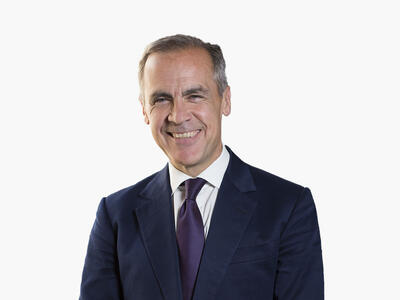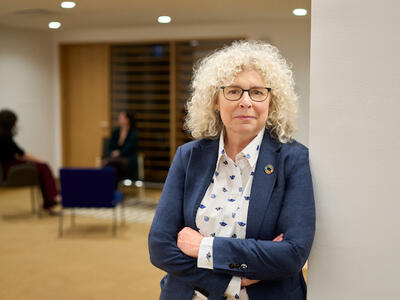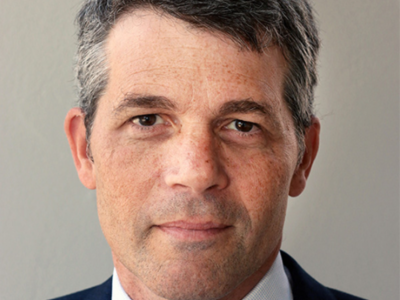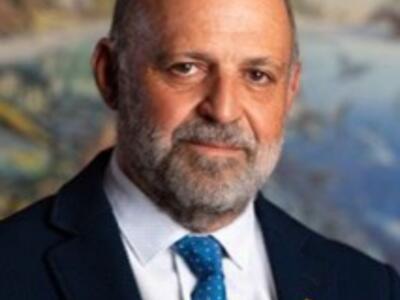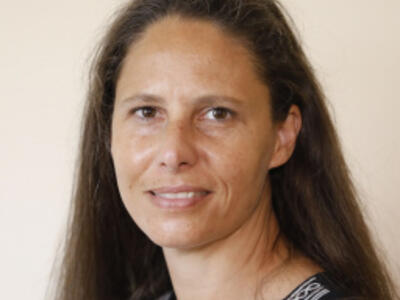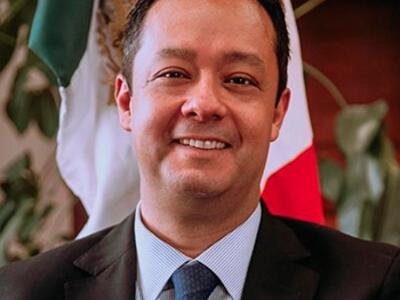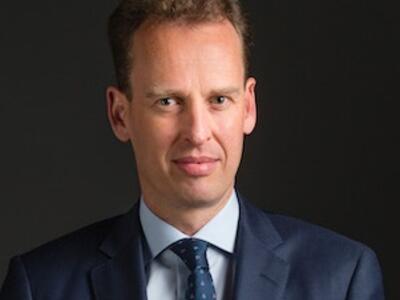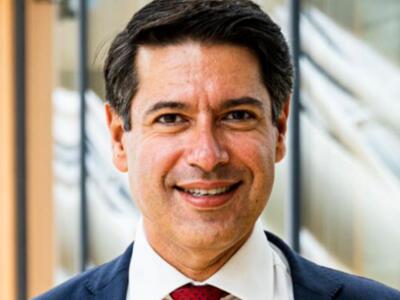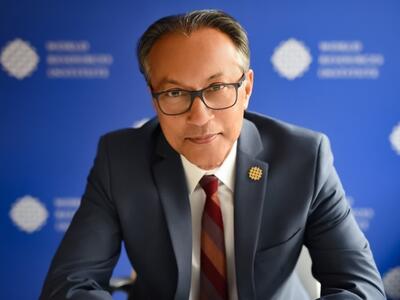 Erik Ringsmuth | Unsplash
Erik Ringsmuth | Unsplash
Finance and Biodiversity Day - 14 december 2022 - COP15
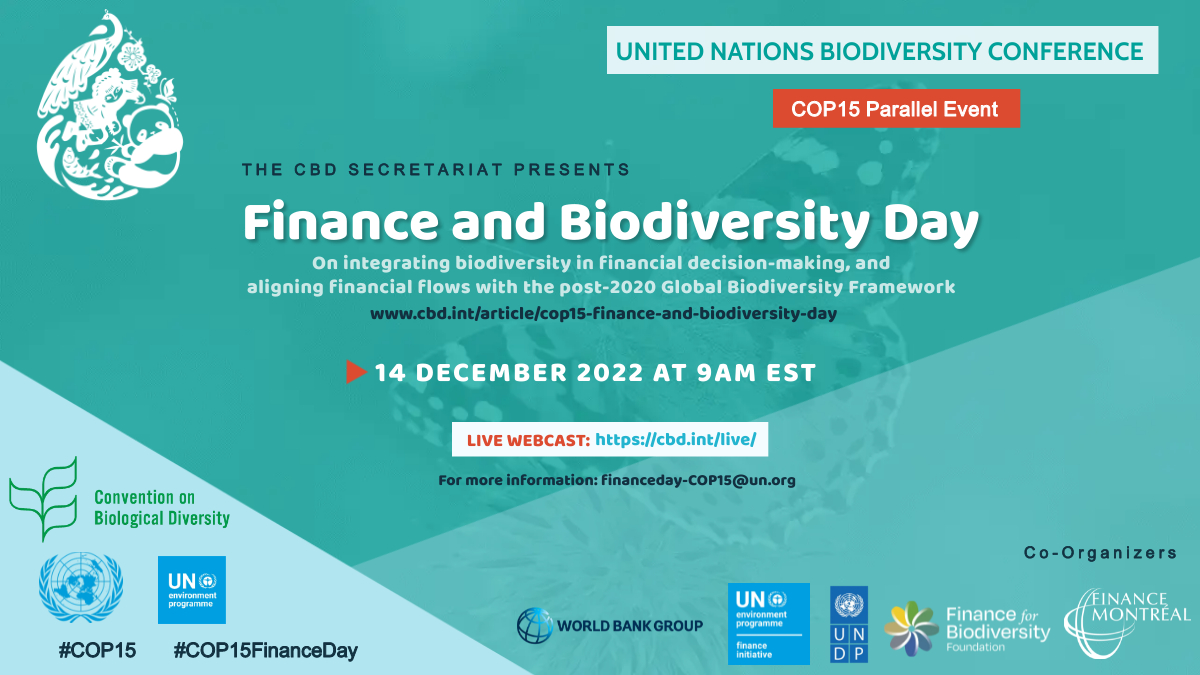
1. Purpose of the Finance and Biodiversity Day
COP15 will include a dedicated full-day event on Finance and Biodiversity. This will provide a unique opportunity for the global financial community to engage in discussion, share perspectives, and communicate on their action, achievements and commitments related to the integration of biodiversity within financial decision-making.
The event will include plenary and break-out sessions with representatives from the breadth of the financial landscape - including policymakers and regulators, financial supervisors and central banks, public finance, and the various facets of private finance.
The discussions and debates will explore the relevant linkages between the draft post-2020 Global Biodiversity Framework (GBF) and the financial system and the economy, as well as a plan of action for supporting the implementation of the GBF. This will include particular focus on the enabling conditions, mechanisms, and opportunities for, the alignment of financial flows with the vision of the framework. This will be an opportunity for Negotiators at COP15 to interact with, and reflect upon on the roles and responsibilities of financial sector participants in implementing the GBF.
This event will also provide a forum for:
- Building alignment on the necessary content of the proposed post 2020 Global Biodiversity Framework for it to catalyze a transformation of the financial landscape and the global economy to protect, restore and make sustainable use of, biodiversity and natural resources.
- Sharing perspectives, insights, lessons learnt, amongst financial professionals and the representatives of society, on enabling conditions and solutions for investing into activities that reduce risks and impacts to biodiversity, generate positive impacts, and foster the sustainable use of natural resources.
- Exploring the linkages and synergies between climate action and biodiversity action, between net-zero pathways and pathways for achieving the 2030 targets and 2050 vision of the GBF.
- Communicating on commitments, initiatives, achievements, that contribute to the alignment of financial flows and mobilization of resources from all sources in support of the 2030 targets and 2050 vision of the GBF - including focus on policy making, financial supervision, repurposing of harmful incentives, investing into green assets, as well as reducing risks, impacts and dependencies in investments.
The event will also include breaks for networking, including a networking lunch hosted by Finance Montréal and a closing reception co-hosted by the United Nations Development Programme (UNDP).
The programme will include a dedicated plenary session for discussion with Finance Ministers, hosted by the World Bank.
2. On the critical relationships between biodiversity and the financial sector
Whilst human-induced threats to biodiversity have long been acknowledged, recognition started to grow only over the past two to three years that today's alarming rate of biodiversity loss creates threats to society, the economy and the financial system. In early 2022, the World Economic Forum ranked Biodiversity loss as one in three top risks facing our society, alongside Climate Change and Extreme Weather events – those three risks being highly interlinked and amplifying each other.
Much of our economy is dependent on resources provided by nature - it is now well known that over $44 trillion of yearly economic value generation – more than half of the world’s GDP – relies on services that are provided by nature1 .
Given how nature underpins much of the global economy, and given today’s accelerating rate of nature loss, the value and resilience of financial assets - which ultimately rely on activities and assets within the « real economy » - are themselves at risk. Until recently, the destruction or use of nature - such as deforestation, natural habitat conversion, unregulated exploitation of resources - was not included in financial accounting or risk assessment approaches. Whilst this unfortunately continues to be the case in most economic sectors, ongoing initiatives are building the case, and proposing approaches, for recognizing the value of natural capital thus lost, as well as for accounting for the financial materiality of risks related to nature loss.

Sadly, vast public and private financial flows are still being targeted around the world to activities that either directly harm biodiversity, or apply insufficient safeguards to manage avoidable impacts onto biodiversity. For instance, in 2019, major investment banks provided an estimated $2.6 trillion (c. the entire GDP of Canada or the UK) in sectors which governments and scientists agree are the primary drivers of biodiversity destruction2 . Public subsidies harmful to biodiversity range from $345 billion in agriculture from 54 countries in 20183 , to up to $542 billion in the agriculture, forestry and fisheries sectors only in 2019, not to mention an estimated $395-478 billion of subsidies to fossil fuel production. These figures dwarve the total amounts of financial flows into biodiversity conservation globally, which were estimated as between US$ 124 and US$ 143 billion4 .
According to the Panel of Experts on Resource Mobilization of the Convention on Biological Diversity (CBD) published in March 2022, «there are a range of estimates for the funds needed for the implementation of the post-2020 global biodiversity framework, whose level of ambition has of course not yet been finalized. [...] estimates on future funding needs differ significantly, varying from lower estimates of US$ 103 billion to US$ 178 billion – solely to secure 30% terrestrial and marine protected areas by 2030 - to higher estimates of US$ 403 billion and US$ 711 billion annually.»3
Financial institutions, like businesses, rely extensively on the services and resources provided by nature. At the same time, they play an important role in incentivizing activities that harm nature, when they could decidedly encourage activities that protect, regenerate, and make sustainable use of nature. Finance sector participants, from policy makers to public and private banks and investors, have a responsibility to support a shift in financial practices so that financial flows of all kinds support the vision of the post 2020 Global Biodiversity Framework.
Resources
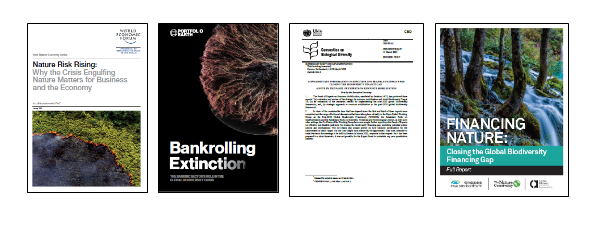
- [1] Nature Risk Rising: Why the Crisis Engulfing Nature Matters for Business and the Economy,
World Economic Forum, in collaboration with PwC, 2020 [PDF, 6.44 Mb] - [2] Bankrolling Extinction: The Banking Sector’s Role in the Global Biodiversity Crisis,
Portfolio Earth, 2019 [PDF, 22.83 Mb] - [3] Supplementary information on effective and feasible pathways for closing the biodiversity finance gap: a note by the panel of experts on resource mobilization,
Third Meeting of Subsidiary Body on Implementation, Geneva, 14-29 March 2022 [PDF, Mb] - [4]Financing Nature: Closing the global biodiversity financing gap,
The Paulson Institute, The Nature Conservancy, and the Cornell Atkinson Center for Sustainability, Deutz, A.,& Al., 2020.
3. Key topics
Key topics to be discussed during the Finance and Biodiversity Day include:
- Recognizing the importance of biodiversity and natural resources as a pillar of financial stability and the economy; exploring the role of financial policymakers and supervisors in reducing systemic risks for the financial system associated with the dual crisis of biodiversity loss and climate change.
- Mechanisms, instruments and opportunities for transforming the policy and regulatory environment to enable a shift in financial flows towards the protection, regeneration, and sustainable use of, biodiversity and natural resources.
- Action, commitments, opportunities for aligning financial flows with the post 2020 Global Biodiversity Framework, including the 2050 vision of « living in harmony with nature » and the 2030 milestone targets proposed in the GBF. This includes eliminating and repurposing harmful subsidies and other incentives, reducing biodiversity-related risks and impacts in investments, as well as mobilizing new resources towards biodiversity.
- Solutions for scaling-up the financing of activities that protect, regenerate and make sustainable use of biodiversity, as well as promote social development and equity, including support to nature-based solutions, innovative financial approaches, public-private partnerships, and the role of local communities and indigenous people.
- Exploring the Climate and Nature Nexus, synergies between the financing of biodiversity and the financing of climate change adaptation and mitigation, and leveraging on ‘net zero pathways’ to develop and set organizations onto ‘nature-positive pathways’.

4. Agenda
- Wednesday 14 December 2022
- Montreal Convention Centre (Palais des Congrès de Montréal)
- Room location: Multipurpose Room 210A for Plenary Sessions and Breakout sessions 1 and 2
- Room location: Contact Group Room 230A for Breakout Sessions 2 and 4
- Room capacity:
- Negotiator teams at COP15, global financial community (policymakers, supervisors, public and private financial institutions), corporates, civil society
14 DECEMBER 2022 |
|---|
Registration
Morning Plenary Sessions |
|---|
[ Webcast recording: EN | FR | 中文 ]
Opening remarks: making the post 2020 GBF a landmark agreement for financial decision-making
Keynote address to emphasize the important role of the financial policymakers and financing decision-makers in reversing nature loss, closing the biodiversity finance gap, and aligning financial flows with the vision, goals and targets of the post 2020 GBF.
- Speakers
- Ms Inger Andersen, Executive Director, United Nations Environment Programme (UNEP)
- Ms. Elizabeth Maruma Mrema, Executive Secretary of the Convention on Biological Diversity
- Mr. Mark Carney, United Nations’ Special Envoy on Climate Action and Finance and co-Chair of Glasgow Financial Alliance for Net Zero (GFANZ)
- Mr. Emmanuel Faber, Chair, International Sustainability Standards Board (ISSB)
+++ Photos of the session +++
Plenary 1: Depending on nature: protecting biodiversity to address systemic risks for the financial system. Dialogue between financial supervisors and boards
A high-level session to explore how, given the dependency of our economy on nature and the many benefits that nature provides to society, the erosion of biodiversity creates systemic risks for the financial system. Building the case for the integration of biodiversity conservation as a priority component of financial supervisory action and investment decision-making. An opportunity for dialogue between financial supervisors and CEOs of public and private financial institutions on recognizing risks, setting an enabling environment, reforming / repurposing harmful incentives, and taking action towards the alignment of financial flows with the vision, goals and targets of the GBF.
- Speakers
- Ms. Saskia de Vries, Head of the International Financial Architecture department at the Financial Stability division of De Nederlandsche Bank, and co-Chair of the Taskforce on Nature-related Risks of the NGFS
- Ms. Geneviève Morin, CEO of Fondaction
- Mr. Bertrand Millot, Head of Sustainable Investment, Caisse des Dépôts et Placements du Québec (CDPQ)
- Mr. Ricardo Mourinho, Vice President, European Investment Bank (EIB)
- Mr. Ravi Menon, Chair of Network for Greening the Financial System (NGFS) and Managing Director of the Monetary Authority of Singapore (Watch Mr. Menon's pre-recorded video presentation)
- Moderator
- Ms. Margaret Kuhlow, Finance Practice Leader, WWF International
+++ Photos of the session +++
Plenary 2: Leveraging opportunities and overcoming challenges for financial flows alignment and resources mobilization: Greening the finance and financing the green
A high-level plenary session to unroll the opportunities, and the challenges, that senior leaders of public and private financial organizations experience in integrating biodiversity within the organization’s culture and strategy. The conversation will also explore how a well-thought policy and regulatory landscape encourages positive action towards biodiversity.
The session will allow for the sharing of perspectives and lessons learnt on integrating the consideration of biodiversity in the investment strategy in private and public financial institutions, recognition of the materiality of risks and impacts associated with nature loss and incorporation of the dimension of biodiversity in the enterprise risk management process, and the opportunities and appetite to set the institution on a course to mainstreaming biodiversity and aligning financial flow (both through mobilizing dedicated resources towards biodiversity, and directing non-dedicated financial flows towards activities that reduce negative impacts and enhance positive impacts).
- Speakers
- Ms Amanda Blanc, CEO of Aviva
- Mr. Marcos Neto, Director, Finance Hub, United Nations Development Programme (UNDP)
- Mr. Rémy Rioux, Chair of International Development Finance Club (IDFC), CEO of Agence Française de Développement (AFD)
- Mr. Benigno Lopez, Vice President, Sectors and Knowledge, Interamerican Development Bank
- Mr. Keith Tuffley, Vice Chairman, Global Co-Head, Sustainability and Corporate Transition, Citi
- Moderator
- Mr. Eric Usher, Head of UN Environment Programme Finance Initiative (UNEP FI)
+++ Photos of the session +++
Plenary 3: The economic, finance and nature nexus : A conversation with Ministries of Finance (hosted by the World Bank)
A conversation between Ministries of Finance on the implications of biodiversity loss as a development issue, building the case for action. This session will engage Ministers and leaders in the financial community in a conversation that demonstrates the benefits of adopting economic policies and fiscal incentives that have a positive impact on biodiversity as well as on the economy.
The session will highlight recent evidence of fiscal policies development that integrate the consideration of nature, the recognition of systemic risks related to nature loss for the financial and economic system, how win-win policy reform (e.g. subsidies reform, expansion of payment for ecosystem services, etc) can help promote economic efficiency and resilience, whilst closing the nature financing gap, as well as pathways for mobilizing private finance for biodiversity
- Speakers
- The Hon. Arkhom Termpittayapaisith, Minister of Finance, Thailand (video message)
- The Hon. Amos Lugolobi, State Minister for Finance and Planning, Uganda (virtual)
- The Hon. Eric Girard, Minister of Finance, Quebec
- Mr. Gabriel Yorio González, Deputy Minister of Finance and Public Credit, Mexico (virtual)
- The Baroness Penn, Treasury Lords Minister, United Kingdom
- Ms. Jutta Urpilainen, European Commissioner for International Partnerships (virtual)
- Mr. Pekka Moren, Special Envoy to Minister of Finance, Finland
- Ms. Carola Moreno, Finance and International Affairs Coordinator, Chile
- Mr. Emmanuel Nyirinkindi, Vice President, Cross-cutting Solutions, International Finance Corporation
- Chair
- Ms. Mari Elka Pangestu, Managing Director of Development Policy & Partnerships, The World Bank
- Moderator
- Ms. Valerie Hickey, Global Director, Environment, Natural Resources and Blue Economy, The World Bank
+++ Photos of the session +++
Networking lunch (buffet) sponsored by Finance Montreal
Afternoon break-out sessions |
|---|
Breakout session 1: Mainstreaming biodiversity within public policies - ongoing initiatives and achievements
A discussion on public policy and planning instruments for mainstreaming biodiversity at the national level, including national development plans and other strategies, institutional co-ordination and national budgets. This will explore how policymakers can set an enabling landscape for biodiversity mainstreaming and alignment of financial flows at domestic level, including via the repurposing of harmful incentives and subsidies, setting of dedicated financial mechanisms such as sustainability-linked sovereign debt and payment for ecosystem services, and dialogue with public and private financial organizations. The session will also be an opportunity to share stories and case studies of successful integration of biodiversity within public policies, and lessons learnt on opportunities and challenges.
- Speakers
- Ms. Vanessa Ushie, Acting Director, African Natural Resources Management and Investment Centre, African Development Bank
- Ms. Alicia Montalvo, Manager (Gerente), Climate Action and Positive Biodiversity, CAF
- Mr. Ramzi Issa, Managing Director, Crédit Suisse
- Ms. Tracey Cumming, Senior Technical Advisor, BIOFIN Initiative, United Nations Development Programme (UNDP)
- Moderator
- Mr. Jeremy Eppel, Principal, Nature Finance
[ Photos of the session ] [ Webcast recording ]
Breakout session 2: Approaches for tracking, measurement, target setting and disclosures as a means of mainstreaming biodiversity within the organization
A discussion between representatives of leading initiatives for tracking, measurement, target setting and disclosures, as well as representatives of financial institutions. This will explore the linkages, differences, and synergies between a selection of initiatives, and explore takeaways from implementation of such frameworks by financial institutions. The session will provide an opportunity to unroll the link between measurement and reporting, and effective mainstreaming of biodiversity within the organization’s culture.
- Speakers
- Ms. Emily McKenzie, Technical Director, Taskforce on Nature related Financial Disclosures (TNFD)
- Dr. Varsha Vijay, Technical Director, Science Based Targets Network
- Mr. Gilles Kleitz, Executive Director, Sustainable Development Solutions, French Development Agency (AFD)
- Ms Marine de Bazelaire, Group Advisor, Natural Capital, HSBC
- Dr. Vian Sharif, CEO, Nature Alpha and Head of Sustainability, FNZ, member of the Taskforce on Nature Markets
- Moderator
- Mr. Grant Rudgley, Lead, Banking Environment Initiative & Nature-related Finance, Cambridge institute for Sustainability Leadership
[ Photos of the session ] [ Webcast recording: part 1 | part 2 ]
Networking break
Breakout session 3: Developing nature-positive pathways to align financial flows - building on synergies with net zero pathways
A discussion between financial institutions and organizations active in the space of sustainability in finance, on how to use the 2050 vision and goals, and 2030 targets of the post 2020 Global Biodiversity Framework, to define pathways for organizations to contribute to reversing biodiversity loss and achieve a common vision of living in harmony with nature by 2050. This session will explore synergies between climate action and nature action, and reflect upon how experience from “net zero” climate pathways may provide a basis for developing “nature positive” pathways for mainstreaming of biodiversity, financial flows alignment, and resources mobilization.
- Speakers
- Ms Joy Williams, Executive Director, North America, Glasgow Financial Alliance for Net Zero (GFANZ)
- Ms Valérie-Noëlle Kodjo Diop, Director of Innovation and Sustainable Development, West African Development Bank
- Ms Elizabeth Littlefield, Senior Partner, West Africa Blue, Senior Advisor, Pollination
- Mr. Xavier Michon, Deputy Secretary, the United Nations' Capital Development Fund (UNCDF)
- Mr. Brian Kernohan, Chief Sustainability Officer, Manulife Investment Management
- Moderator
- Ms. Jessica Smith, Nature Lead, UN Environment Programme Finance Initiative (UNEP FI)
[ Photos of the session ] [ Webcast recording ]
Breakout session 4: Innovative solutions for scaling-up investment towards ‘nature-positive’ outcomes
A discussion to share perspectives on how to scale-up investment towards ‘nature-positive’ outcomes, leveraging on ambition from financial decision-makers and innovation from solution providers and leading to tangible alignment of financial flows towards activities that protect and regenerate, rather than destroy, nature.
The conversation will take stock of today’s market asymmetry whereby many investors seek to invest into sizeable and de-risked green assets, when many solution providers and project proponents need seed or early venture funding in support of pilot or small-scale approaches, or activities with uncommon terms of security surrounding, for instance, land tenure or revenue model. The conversation will also explore how local community dialogue, and public-private collaboration can help channel investment towards ‘nature-positive’ activities.
- Facilitator
- Ms. Romie Goedicke, Associate Lead, Nature, UNEP Finance Initiative
- Speakers
- Ms. Marthe Tollenaar, Impact and ESG Director, Sail Ventures
- Ms Alexandra Albin, Head of Division Equity and Regional Funds, Sub-Saharan Africa and Latin America, Kreditanstalt für Wiederaufbau (KfW)
- Dr. Frank Hawkins, International Union for the Conservation of Nature and Natural Resources (IUCN)
- Mr. Nabil Khadri, Head of Environment and Amazon Fund, Banco Nacional de Desenvolvimento Econômico e Social (BNDES)
- Mr. Gregory Watson, Principal Specialist, Biodiversity and Natural Capital, Natural Capital Lab, Climate Change and Sustainable Development Department
- Moderator
- Ms. Romie Goedicke, Associate Lead, Nature, UN Environment Programme Finance Initiative (UNEP FI)
[ Photos of the session ] [ Webcast recording: part 1 | part 2 ]
Break
Closing Plenaries |
|---|
[ Webcast recording: EN | FR | 中文 ]
Plenary 4: Building ambition for the financing of biodiversity: from mobilising resources to aligning all financial flows
This session will discuss how political ambition should catalyse the mainstreaming of biodiversity in financial decision-making, supporting high ambition for the protection, restoration and sustainable use of biodiversity.
- Keynotes/Speakers
- The Rt Hon Lord Goldsmith, Minister of State (Overseas Territories, Commonwealth, Energy, Climate and Environment)
- Mr. Carlos Manuel Rodriguez, CEO, the Global Environmental Facility (GEF)
- Ms. Carol Laible, CEO of Domini Impact Investment
- Moderator
- Ms. Anita de Horde, co-Founder, Finance for Biodiversity Foundation
+++ Photos of the session +++
Closing Plenary: Transforming finance – Building a plan of action to align the financial sector with the shared vision of the post 2020 Global Biodiversity Framework
This high-level session will build a perspective for action on nature action, to support financial sector alignment with the shared vision of the post 2020 GBF for the various parts of the financial landscape (policymakers and regulators, public finance, private finance).
The session will build upon takeaways from early plenary and breakout sessions and discuss a proposed plan for action that builds upon existing commitments, pledges and calls for action already released before of during COP15 (such as the NGFS position statement on nature, Finance for Biodiversity Pledge, 10-points plan released at UNGA of September 2022, etc).
- Keynote
- Mr. Frank Elderson, Vice-Chair of the Supervisory Board, European Central Bank (Watch Mr. Elderson's pre-recorded video presentation)
- Speakers
- Ms. Jo Tyndall, Director for the Environment Directorate, Organisation for Economic Cooperation and Development (OECD)
- Mr. Ani Dasgupta, CEO, World Resources Institute
- Ms. Laurence Pessez, ESG Director, Group, BNP Paribas
- Mr. Jan Erik Saugestad, CEO, Storebrand Asset Management
- Moderator
- Ms. Odile Conchou, Senior Advisor, Finance and Nature, Agence Française de Développement (AFD)
- Closing remarks
- Ms. Annemarie Straathof, Vice President Risk and Compliance and Chief Risk Officer, European Bank for Reconstruction and Development (EBRD)
+++ Photos of the session +++
Reception hosted by United Nation Development Programme (UNDP)
5. EXPECTED OUTCOME: PROPOSED PLAN OF ACTION
The outcomes of the Finance and Biodiversity Day will be used to finalized a proposed Statement of Outcome, including a recommended Plan for Action for financial sector organisations.
This is builds upon, and is consistent with recent other declarations, proposals and pledges from political leaders and from financial sector initiatives, including the Kunming Declaration of the Parties to the CBD, the Leader’s Pledge for Nature, the 10 Points Plan for Financing Biodiversity, the COP26 Multilateral Development Bank’s Joint Statement on Nature, the Financial Sector Commitment Letter on Eliminating Commodity-Driven Deforestation, the International Development Finance Club’s Common Position Paper on Biodiversity, the Network for Greening the Financial System’s Statement on Nature-Related Financial Risks, the Finance for Biodiversity Pledge, the COP15 Statement from the Private Financial Sector, the Principles for Responsible Investments, the Principles for Responsible Banking, and the Principles for Responsible Insurance.
It is hoped that this Statement of Outcome and Plan for Action will provide a useful reference for financial sector organizations seeking guidance as they embark on their journey to further integrating the consideration of biodiversity in their strategies, policies, and decision-making processes, to collectively work towards achieving the shared vision of the Global Biodiversity Framework.
A draft version of this Statement of Outcome is provided for consultation and comments.
6. HOW TO ATTEND
The Finance and Biodiversity Day is an event opened to all registered delegates to the United Nations Conference on Biodiversity. The event is available online and webcast at https://cbd.int/live/. For on-site attendance, no registration is required but please confirm that you will be able to attend to help us better plan the day and improve your experience of the event (seats, catering etc.).
*** Confirm your on-site attendance by filling out this form ***
7. PARTNERS
CO-ORGANIZERS

Finance for Biodiversity Foundation
financeforbiodiversity.org
Finance Montréal
finance-montreal.com
Secretariat of the Convention on Biological Diversity (CBD)
cbd.int
United Nations Development Programme
undp.org
UN Environment Programme Finance Initiative (UNEPFI)
unepfi.org
The World Bank Group
www.worldbank.org
OTHER PARTICIPANTS
The Finance and Biodiversity Day is being organized in consultation with a range of participants, many of which will participate through the mobilization of speakers. These include policymakers, financial supervisors and central banks, multilateral development banks, public financial institutions, private financial institutions (including banking, asset management, insurance, impact investing), and multilateral organizations. The complete list of participating organizations will be published in due course. To-date, organizations that have confirmed interest to mobilize speakers include those listed hereunder:
POLICY MAKERS
(to be announced)
Network for Greening the Financial System (NGFS)
ngfs.net
FINANCIAL SUPERVISORS AND CENTRAL BANKS
(to be confirmed)
PUBLIC FINANCIAL INSTITUTIONS
AND MULTILATERAL ORGANISATIONS
Multilateral Development Banks (tbc)
BIOFIN, The Biodiversity Finance Initiative
biofin.org
The Global Fund for Coral Reef (GFCR)
globalfundcoralreefs.org
Interamerican Development Bank (IADB)
iadb.org
International Development Finance Club (IDFC)
www.idfc.org
Organisation for Economic Co-operation and Development (OECD)
oecd.org
United Nations Capital Development Fund (UNCDF)
uncdf.org
United Nations Development Programme (UNDP)
undp.org
World Wildlife Fund (WWF)
wwf.org
PLATFORMS / INITIATIVES / THINK TANKS
Finance for Biodiversity Foundation
financeforbiodiversity.org
Interface Dialogue on Finance and Biodiversity (IDFB Dialogue)
idfb-dialogue.org
International Sustainability Standards Board (ISSB)
issb.org
Nature Finance (ex F4B)
www.f4b-initiative.net
Partnership on Biodiversity and Finance (PBF)
Population Reference Bureau (PRB)
prb.org
Principles for Responsible Investment (PRI)
unpri.org
PSI
psi.org
Taskforce on Nature-related Financial Disclosures (TNFD)
tnfd.global
UN Environment Programme Finance Initiative (UNEPFI)
unepfi.org
World Economic Forum (WEF)
weforum.org
ACADEMIA
Cambridge Institute for Sustainability Leadership (CISL)
cisl.cam.ac.uk
8. SPEAKERS












